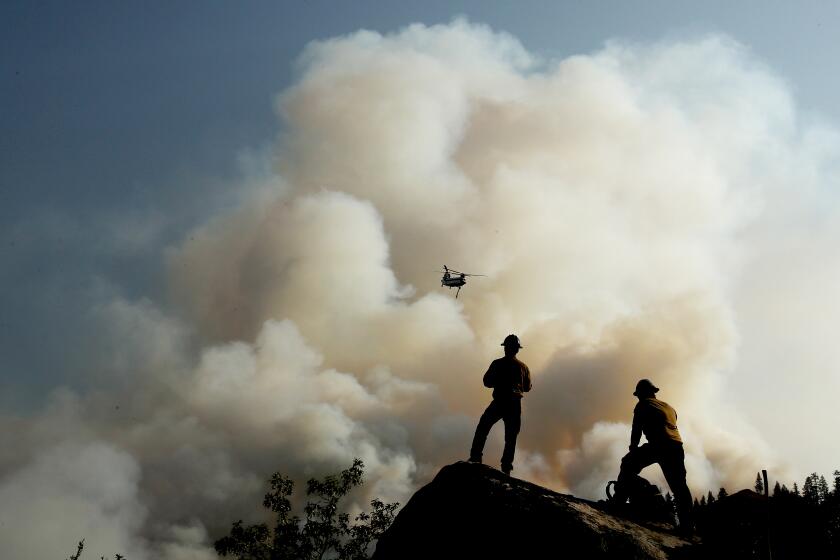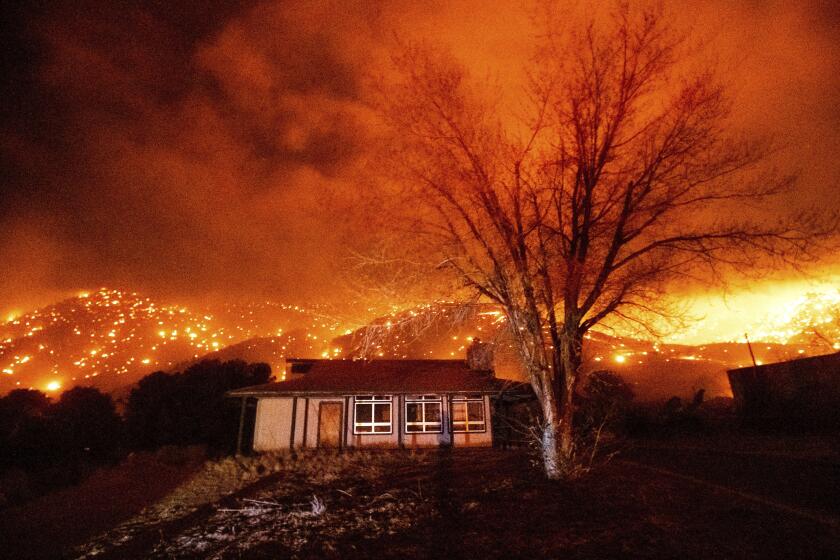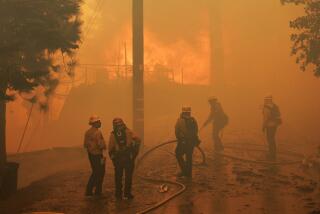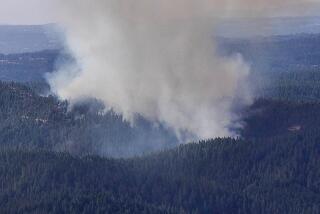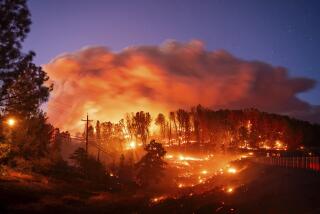Caldor fire evacuees find solace on church grounds
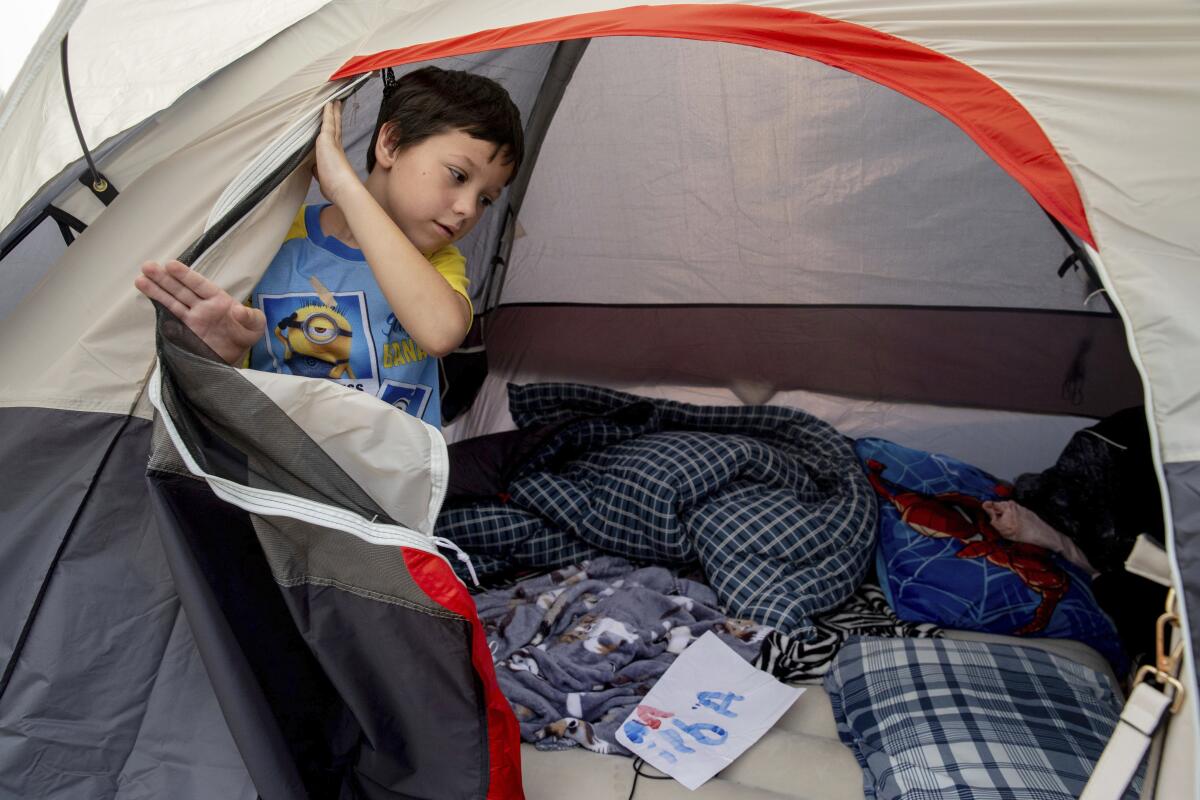
PLACERVILLE, Calif. — At VantagePoint Church in Placerville, Calif., the doors — and the grounds — were open to those fleeing the Caldor fire.
In the reception area, folding tables were set up with granola bars, cases of water and a coffee station. Another table had pet and baby supplies, and there were piles of clothes with signs urging people to take what they needed. The TV was set to local news for updates on the fire, which had burned more than 70,000 acres by Friday.
Inside the church where services are normally held, air mattresses lined the floor.
Art Summerfield, 72, said there were just three evacuees on site, including him and his girlfriend.
Summerfield fled his home in nearby Pollock Pines on Monday. After visiting three evacuation centers and finding them all full, he and his girlfriend spent days staying in their cars in various parking lots.
The security guard who kicked them out of the lot at Marshall Hospital in Placerville is a member of VantagePoint Church and told them about the shelter, Summerfield said.
The couple — among the nearly 25,000 who have had to evacuate their homes — arrived Thursday.
Smoke is drenching the communities surrounding the growing Caldor fire in El Dorado County, which has burned more than 100 structures.
“She and I had been bumming around from shelter to shelter, but this is the place,” Summerfield said, calling it a “well-hidden secret” with wonderful staff.
Summerfield is no stranger to fire. The last time he had to evacuate was in 1986, in Santa Barbara, and the property he was renting burned. He said he didn’t lose too much.
“I didn’t have a lot,” he said. “I was young.”
But Monday marked the first time he’d had to evacuate his home in Pollock Pines since moving there in 1998.
He took what he could carry, but forgot some essentials. “I wish I grabbed a shaver,” he said, rubbing his face.
Although his house remained under an evacuation order Friday, Summerfield was contemplating going back home. He lives close to the dividing line with Camino, which is under an evacuation warning, not an order.
But after sitting in his car and mulling it over, Summerfield thought better of the move. He shuffled back inside the church, carrying a fold-up sleeping pad under his arm.
Drought, climate change and an early start to fire season mean this fall could be one of fire, smoke, poor air quality and evacuations in Southern California. Here’s how you can prepare now.
Marlene Craven, 68, a volunteer at the church, said it was the first time the building had been used as an evacuation center.
“The community needed a place to go,” she said.
All the items on offer were dropped off by congregants after the church put out a call for donations.
Craven has lived in El Dorado for about 15 years. She said the area has always been fire-prone, but things have gotten worse in recent years, noting the yellowish smoky skies and eerie red sun.
“This is getting so old,” she said.
Ed Holt, 67, his 68-year-old wife, Linda, and their cat, Cheerio, were staying in a camper in the church parking lot after evacuating their Cedar Grove home Tuesday. They spent the first night at a park-and-ride lot and have been outside the church since Wednesday.
The couple said that they were holding up OK, but that Cheerio, who had never been in the camper, was having a rougher time. He has been keeping them up, with meows that start around 3 a.m.
It was the first time the Holts have had to evacuate in the 30 years they’ve lived in the area. They consider themselves lucky.
“We know where we live,” Ed Holt said. “It’s kind of a hot spot. We live in the forest.”
At the same time, he’s watched the fires grow worse in recent years, affecting broader swaths of the community.
“I think we’re going to be seeing this more and more,” he said. “We’re not getting rain, it’s so dry and it’s getting hotter every summer.”
A light rain of ash fell as he spoke, coating his camper.
He and his wife have no idea when they might be able to return home. One official told them to expect to be displaced for one to two weeks, but it all depends on where the winds blow and how the fire behaves.
Winds from the south are expected to pick up Saturday, fire officials said, sparking fears of accelerated fire growth along the northern edge of the blaze.
Holt said he’s briefly considered moving elsewhere, but he isn’t there yet. He and his wife like it in the foothills.
Still, he said, “I think about it all the time, living someplace I know we’re going to have water.
“The whole Western United States seems like it’s on fire all the time,” he said.
Times staff writer Lila Seidman contributed to this report.
More to Read
Sign up for Essential California
The most important California stories and recommendations in your inbox every morning.
You may occasionally receive promotional content from the Los Angeles Times.
